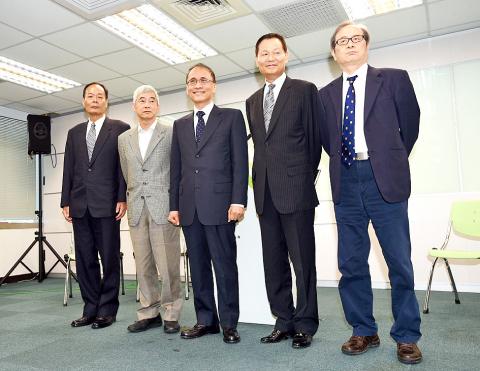Premier-designate Lin Chuan (林全) yesterday announced the final members of his Cabinet, surprising many with his choice of National Taiwan University law professor Yeh Jiunn-rong (葉俊榮) to be minister of the interior.
At a news conference at Democratic Progressive Party (DPP) headquarters in Taipei, Lin introduced his final five picks — Hochen Tan (賀陳旦) for minister of transportation and communications, Lee Shying-jow (李翔宙) to head the Veterans Affairs Council, Lee Chung-wei (李仲威) to head the Coast Guard Administration (CGA), Hsieh Shou-shing (謝曉星) to be the Atomic Energy Council minister and Yeh.
Yeh, who is in the US on an academic trip, was the only one not to attend the news conference.

Photo: Lo Pei-der, Taipei Times
Yeh’s appointment came as a surprise, as media outlets had touted several other candidates — including Taipei City Deputy Mayor Charles Lin (林欽榮), Yilan County Deputy Commissioner Wu Tze-cheng (吳澤成), Tainan Deputy Mayor Tseng Shu-cheng (曾旭正) and former Tainan mayor Hsu Tain-tsair (許添財) — but not Yeh.
“When thinking about who should serve as minister of the interior, we thought about Yeh at the beginning, but he declined,” Lin Chuan said. “We went on and looked for other candidates, but still came back to Yeh.”
He said Yeh was a suitable choice because he is not only a legal expert who specializes in constitutional issues and the environment, he has also served on a number of government positions and is familiar with administrative reform, sunshine bills, environmental issues and territorial planning.
“I believe that he is more than capable of doing the job well,” Lin Chuan said.
However, he said that he had a hard time convincing Yeh to accept the appointment, he finally succeeded to do so two days ago.
Hochen too was unwilling to accept the position at first.
"I tried to convince him many times but failed, until someone eventually successfully did it," Lin said. "I really admired the person who did it, because I couldn't do it even [Hochen and I] have been friends for a long time."
"But I can't tell you who the person is," Lin added.
Lee Chung-wei’s appointment was also seen as a surprise, as the retired navy deputy commander would be the first CGA director-general to have a career military background. The post has usually been held by someone with a police background.
The CGA must defend Taiwan’s territorial waters, so Lee Chung-wei’s experience would help the agency, Lin Chuan said.

Intelligence agents have recorded 510,000 instances of “controversial information” being spread online by the Chinese Communist Party (CCP) so far this year, the National Security Bureau (NSB) said in a report yesterday, as it warned of artificial intelligence (AI) being employed to generate destabilizing misinformation. The bureau submitted a written report to the Legislative Yuan in preparation for National Security Bureau Director-General Tsai Ming-yen’s (蔡明彥) appearance before the Foreign Affairs and National Defense Committee today. The CCP has been using cognitive warfare to divide Taiwanese society by commenting on controversial issues such as Taiwan Semiconductor Manufacturing Co’s (TSMC, 台積電) investments in the

INVESTIGATION: The case is the latest instance of a DPP figure being implicated in an espionage network accused of allegedly leaking information to Chinese intelligence Democratic Progressive Party (DPP) member Ho Jen-chieh (何仁傑) was detained and held incommunicado yesterday on suspicion of spying for China during his tenure as assistant to then-minister of foreign affairs Joseph Wu (吳釗燮). The Taipei District Prosecutors’ Office said Ho was implicated during its investigation into alleged spying activities by former Presidential Office consultant Wu Shang-yu (吳尚雨). Prosecutors said there is reason to believe Ho breached the National Security Act (國家安全法) by leaking classified Ministry of Foreign Affairs information to Chinese intelligence. Following interrogation, prosecutors petitioned the Taipei District Court to detain Ho, citing concerns over potential collusion or tampering of evidence. The

‘COMPREHENSIVE PLAN’: Lin Chia-lung said that the government was ready to talk about a variety of issues, including investment in and purchases from the US The National Stabilization Fund (NSF) yesterday announced that it would step in to staunch stock market losses for the ninth time in the nation’s history. An NSF board meeting, originally scheduled for Monday next week, was moved to yesterday after stocks plummeted in the wake of US President Donald Trump’s announcement of 32 percent tariffs on Taiwan on Wednesday last week. Board members voted to support the stock market with the NT$500 billion (US$15.15 billion) fund, with injections of funds to begin as soon as today. The NSF in 2000 injected NT$120 billion to stabilize stocks, the most ever. The lowest amount it

NEGOTIATIONS: Taiwan has good relations with Washington and the outlook for the negotiations looks promising, Minister of Economic Affairs J.W. Kuo said Taiwan’s GDP growth this year is expected to decrease by 0.43 to 1.61 percentage points due to the effects of US tariffs, National Development Council (NDC) Minister Paul Liu (劉鏡清) said at a meeting of the legislature’s Economics Committee in Taipei yesterday, citing a preliminary estimate by a private research institution. Taiwan’s economy would be significantly affected by the 32 percent “reciprocal” tariffs slapped by the US, which took effect yesterday, Liu said, adding that GDP growth could fall below 3 percent and potentially even dip below 2 percent to 1.53 percent this year. The council has commissioned another institution